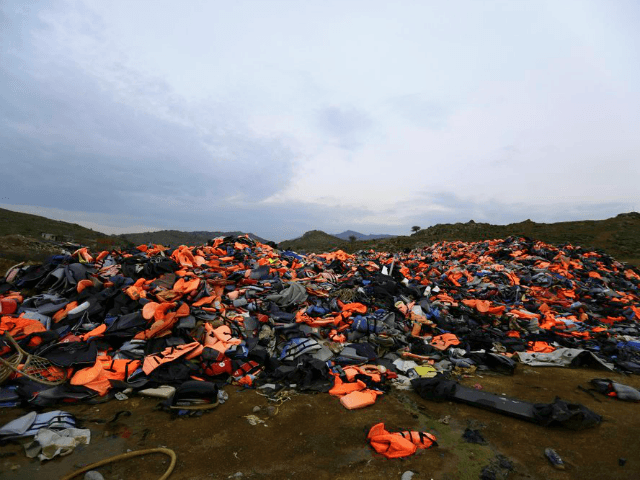THESSALONIKI, Greece (AP) — About 1,500 asylum-seekers were being transported from Greece’s eastern Aegean island of Lesbos to the mainland Monday as part of government efforts to tackle massive overcrowding in refugee camps and a recent spike in the number of people arriving from the nearby Turkish coast.
A ship carrying 635 people set sail from Lesbos Monday morning for the northern port city of Thessaloniki. From there, authorities said, the asylum-seekers would be transported to a camp in Nea Kavala in northern Greece. A second ship carrying nearly 900 people was to leave Lesbos for Thessaloniki on Monday afternoon.
The Citizens Protection Ministry said a total of around 1,000 of those being transferred will be housed in Nea Kavala, where they will be staying in tents until the end of the month, after which they will be transferred to a new camp under construction. The rest will be housed in other facilities in northern Greece.
The transfer was part of decisions made during a national security meeting Prime Minister Kyriakos Mitsotakis convened Saturday, after nearly 600 people arrived on Lesbos in more than a dozen boats in the space of an hour Thursday.
The national security council meeting also decided to speed up the deportation of those whose asylum applications have been rejected, and to abolish the second-stage review of asylum applications. The government also announced increased border surveillance, to activate a maritime surveillance system and to bolster the coast guard’s fleet with 10 new speedboats.
Hundreds of people continue to head to Greece from Turkey each week, despite a 2016 European Union-Turkey deal that restricts new arrivals to the islands pending deportation unless they are successful in their asylum application.
The EU-Turkey deal and the backlog of asylum cases has led to a large bottleneck on the eastern Aegean islands, where asylum-seekers are housed in massively overcrowded camps whose conditions aid groups frequently criticize. In general only those deemed to be in vulnerable groups, such as the elderly, very young and people with serious health problems are eligible for rehousing on the mainland.
Official figures released Friday showed that more than 10,000 people were being held in Lesbos in a facility with a capacity of 3,000, while there was also severe overcrowding on the islands of Chios, Leros, Kos and Samos.
“We do note with concern the large number of arrivals that was reported in Lesbos in Greece which of course only serves to put additional pressure on a system that’s under strain,” European Commission spokeswoman Natasha Bertaud told reporters Monday at the commission’s daily briefing in Brussels.
Migration Commissioner Dimitris Avramopoulos and his services are in “direct and regular contact” with both the Greek and the Turkish authorities at political and technical level, she said.
“We will continue working with the Greek authorities to improve the situation on the island and stand ready to discuss and support the additional emergency measures which were announced by the Greek authorities over the weekend,” she added, noting the Commission had made available “all the necessary funds” to improve living conditions in the camps on the islands.
Bertaud said Europe remains committed to the agreement with Turkey “and we trust that we can continue this work in good faith.”
Elsewhere in the Mediterranean, a charity boat with some 100 migrants on board was seized by Italian authorities after it entered Italian waters and headed for the port of Pozzallo, in Sicily, in defiance of a government ban.
Mission-Lifeline captain Claus-Peter Reisch said bad weather forced him to bring the Eleanore to port after the migrants were stranded on board for eight days by the outgoing populist government’s crackdown on humanitarian rescue boats.
Spurred by Interior Minister Matteo Salvini, the Italian government has issued a decree establishing million-euro ($1.1 million) fines for captains of rescue boats that defy the ban on entering Italian waters or dock without permission.
___
Lorne Cook in Brussels and Frances D’Emilio in Rome contributed to this AP report.

COMMENTS
Please let us know if you're having issues with commenting.